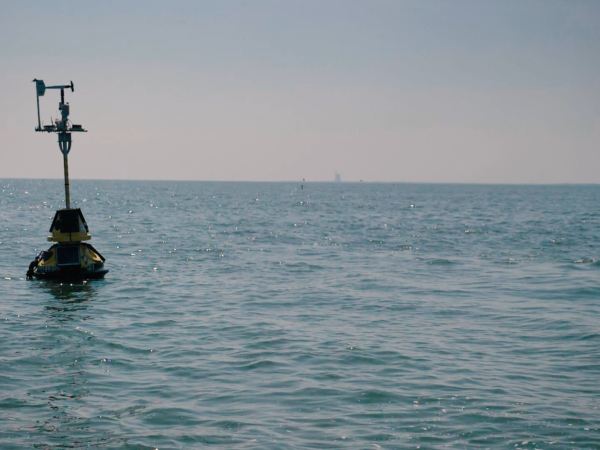
Plastic is the dominant source of beach trash in the Great Lakes region.
That’s the finding by the Chicago-based non-profit Alliance for the Great Lakes in a recently released report that analyzed beach litter picked up by its volunteers over the past 20 years.
“Twenty years of data collected by volunteers shows that 86% of the trash was either fully or partially made from plastic,” the Alliance said in a press release.
The primary culprit, according to the Alliance, is single-use plastic like bottles, cups, wrappers and utensils that break down into smaller, microplastic pieces. Those tiny pieces may be toxic and have ended up in drinking water, fish and even human tissue, the Alliance said.
The report was released to announce the removal of over 10 million pieces of beach trash in the past 20 years and to coincide with its annual day of action on Great Lakes beaches.
Reform plastic production
There is momentum growing across the country to shift the responsibility of the trash burden of plastic production from consumers to producers, according to the Alliance.
To get a clearer picture of the plastic threat and possible solutions, Great Lakes Now spoke with Andrea Densham, a senior policy adviser to the Alliance on sustainability.
“We’ve seen a massive increase in the last 20 years in single-use plastic. Plastic like polystyrene and plastic bags that are used on average for about 12 minutes and then last for 10 or up to 20 years,” Densham said.
According to Densham, the Great Lakes region has increased exposure to plastic pollution.
“One of the things I like to remind folks of in our region is that we not only have the impact of trash as it finds its way into the Great Lakes, we manufacture much of the components of single-use plastic,” said Densham. “The impact of the creation of it and the disposal means we get hit twice.”
Recycling fail
Great Lakes Now asked Densham what role recycling plays related to sustainability and keeping plastic out of the lakes. Chicago, with a big impact on southern Lake Michigan, has a recycling rate below 10% in spite of efforts by multiple mayoral administrations to improve. The national average is 32% according to the U.S. Environmental Protection Agency with a goal of 50% by 2030.
Densham said there is a direct connection between recycling and beach trash.
“A 9% recyclable rate of single-use plastic is challenging across the region. This speaks to the brokenness of our recycling across the country, but especially in the Great Lakes region where it’s important to keep plastics out of the lakes,” Densham said.
Municipalities are responsible, Densham said, for managing waste programs and investment in them has been lacking.
Asked which areas of the region may be lagging on beach health related to litter, Alliance spokesperson Don Carr provided a statement:
“We cannot answer that question using our current litter data. Since this is a community science program and due to the nature of how the data is collected, we can’t really say that one beach, area, or lake is ‘more polluted’ than others.”
Legislative solution?
Densham said manufacturers of single-use plastics need to be part of the solution.
“We haven’t asked the folks who are making the trash to see themselves as partners in finding a solution,” she said.
Densham indicated there’s growing pressure across the country to require more sustainable manufacturing of packaged products.
In May, Minnesota joined Oregon, California, Colorado and Maine in passing what’s known as extended producer responsibility legislation. In Canada, the provinces of Ontario and Quebec already have laws in place that require manufacturers to bear some responsibility for reducing waste during the life of the products they produce.
Industry support for the Minnesota law was mixed. The American Beverage Association supported it, saying in a statement it “will collect more recyclable materials, create local jobs and help protect the environment without burdening Minnesota residents.”
But the American Forest and Paper Association was not in favor, saying in a statement, “our industry provides a recycling model to emulate rather than burden with untested systems that limit future investment.”
Densham pointed out that manufacturers may already have a sustainable group of products.
“We want them to lean more into those products and sunset some of the more damaging and harmful components,” she said. “If we get to the table with manufacturers we can do smart things together.”
Personal responsibility
But those plastic bottles, plates, and wrappers end up on beaches in the form of litter left by beachgoers. What role does personal responsibility play in protecting beaches?
“Education about making changes to more sustainable purchases would be helpful,” Densham said.
But she minimized the impact of litter on the beaches left by beachgoers saying “what is amazing is how much of the litter on beaches comes from rivers and then ends up on our beaches.”
“An educational campaign about litter would be missing most of it and the bigger impact would be an education campaign to move away from single-use plastics and move toward more sustainable options,” according to Densham.
Reality check
Passing legislation in Minnesota that could make producers of single-use plastic more accountable is progress. But Great Lakes policy adviser Dave Dempsey cautions other states may not be as receptive.
“Minnesota is no environmental nirvana but it’s far above the standard of the other Great Lakes states,” said Dempsey. “Its legislators take on issues that politicians in other states duck, especially in waste management and recycling. It had a take back law for electronics 20 years ago.”
Dempsey has advised the U.S. and Canada on trans-border water issues. Previously he worked as communications director for Conservation Minnesota.
He questions whether other Great Lakes states will approach Minnesota’s environmental standard anytime soon.
“They either never had the Minnesota environmental ethic or have lost it after several decades of retrenchment,” said Dempsey.
Two Michigan state legislators recently introduced an extended producer responsibility bill in the House. Both are Democrats and the legislation has no other sponsors.
Democrats have razor thin majorities in the Michigan legislature and Gov. Gretchen Whitmer is a Democrat. But progress on environmental issues has been slow to advance, best illustrated by the failure to reinstate polluter pay laws that were repealed years ago by the Republican majority. That was a stated goal for Democrats, but legislation introduced in 2023 has yet to advance.
Great Lakes Now asked Densham if she is optimistic about expanding producer responsibility legislation to other Great Lakes states.
“We just got a bill passed in Minnesota. If we could get Michigan and Illinois that’s a large population and a lot of the manufacturing industry,” Densham said, adding that eventually she hopes this would have an impact on states like Indiana and Ohio.
More Great Lakes Now reporting on beach litter:
Great Lakes Beach Trash: The Psychology of Littering
Science Says What? Microplastic pollution — how worried should we be?
Featured image: Beach trash. (Photo Credit: Lloyd DeGrane via the Alliance for the Great Lakes)




